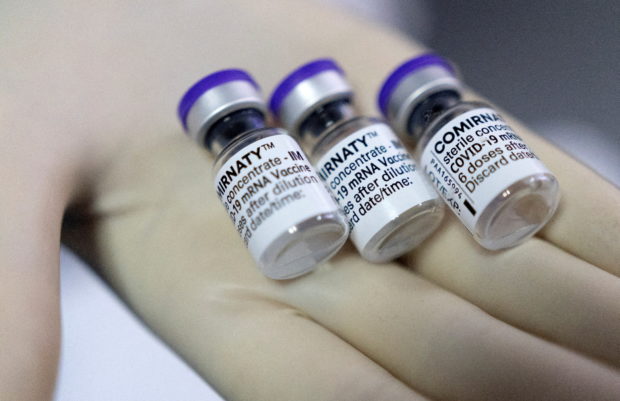Omicron evades immunity better than Delta, Danish study finds

FILE PHOTO: A doctor shows vials of Biontech-Pfizer’s Comirnaty vaccine against COVID-19 at the Institute for Health and Food Safety of Zenica, Bosnia and Herzegovina, December 16, 2021. REUTERS/Dado Ruvic
COPENHAGEN — The Omicron coronavirus variant is better at circumventing vaccinated peoples’ immunity than the Delta variant, according to a Danish study published last week, helping explain why Omicron is spreading more rapidly.
Since the discovery of the heavily mutated Omicron variant in November, scientists have been racing to find out whether it causes a less serious disease and why it appears more contagious than the previously dominating Delta variant.
A virus can be more transmissible due to a number of reasons, such as the time it lingers in the air, its ability to latch onto cells, or its evasion of the body’s immune system.
Investigating nearly 12,000 Danish households in mid-December, the scientists found that Omicron was 2.7 to 3.7 times more infectious than the Delta variant among vaccinated Danes.
The study, conducted by researchers at the University of Copenhagen, Statistics Denmark, and Statens Serum Institut (SSI), suggests the virus is mainly spreading more rapidly because it is better at evading immunity obtained from vaccines.
Article continues after this advertisement“Our findings confirm that the rapid spread of the Omicron (variant) primarily can be ascribed to the immune evasiveness rather than an inherent increase in the basic transmissibility,” the researchers said. The study has yet to be peer-reviewed.
Article continues after this advertisementSeventy-eight percent of Danes have been fully vaccinated, while nearly 48% of those have received a third “boosted” shot. More than eight out of ten Danes have received Pfizer-BioNTech’s vaccine.
The study also found that booster-vaccinated people are less likely to transmit the virus, regardless of the variant, than the unvaccinated.
While more transmissible, the Omicron variant does seem to induce less serious disease, SSI’s technical director, Tyra Grove Krause, told local media on Monday.
“While Omicron will still be able to put pressure on our healthcare system, everything indicates that it is milder than the Delta variant,” she said, adding the risk of being hospitalized with Omicron was half of that with Delta.
That echoes the results of some other studies into Omicron.
Out of a total of 93 people admitted to the hospital due to COVID-19 from Omicron in late December, less than five were receiving intensive care, Danish data showed.
“This may be what is going to lift us out of the pandemic, so that this becomes the last wave of corona,” Krause said.
For more news about the novel coronavirus click here.
What you need to know about Coronavirus.
For more information on COVID-19, call the DOH Hotline: (02) 86517800 local 1149/1150.
The Inquirer Foundation supports our healthcare frontliners and is still accepting cash donations to be deposited at Banco de Oro (BDO) current account #007960018860 or donate through PayMaya using this link.